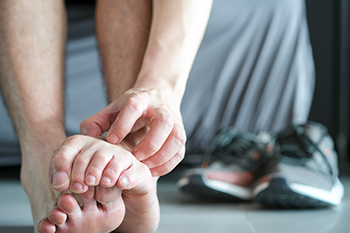
Athlete’s foot is a common foot condition that is known to be contagious. It is caused by a fungus and lives in environments that are warm and moist. When the feet become damp, this can be an ideal place for this type of fungus to grow and thrive. Additional areas include shower room floors, locker rooms, and public swimming pools. The symptoms consist of red skin and itchiness between the toes and on the bottom of the feet, and the skin can begin to crack. In severe cases, small blisters that are filled with pus may develop. There are over-the-counter treatments that may be helpful in treating mild cases of athlete’s foot. If there is little or no improvement, it is strongly suggested that you schedule an appointment with a podiatrist who can prescribe the correct medication for you.
Athlete’s Foot
Athlete’s foot is often an uncomfortable condition to experience. Thankfully, podiatrists specialize in treating athlete’s foot and offer the best treatment options. If you have any questions about athlete’s foot, consult with one of our podiatrists from Lovely Foot Associates, PC. Our doctors will assess your condition and provide you with quality treatment.
What Is Athlete’s Foot?
Tinea pedis, more commonly known as athlete’s foot, is a non-serious and common fungal infection of the foot. Athlete’s foot is contagious and can be contracted by touching someone who has it or infected surfaces. The most common places contaminated by it are public showers, locker rooms, and swimming pools. Once contracted, it grows on feet that are left inside moist, dark, and warm shoes and socks.
Prevention
The most effective ways to prevent athlete’s foot include:
Symptoms
Athlete’s foot initially occurs as a rash between the toes. However, if left undiagnosed, it can spread to the sides and bottom of the feet, toenails, and if touched by hand, the hands themselves. Symptoms include:
Diagnosis and Treatment
Diagnosis is quick and easy. Skin samples will be taken and either viewed under a microscope or sent to a lab for testing. Sometimes, a podiatrist can diagnose it based on simply looking at it. Once confirmed, treatment options include oral and topical antifungal medications.
If you have any questions, please feel free to contact our office located in Johnstown, PA . We offer the newest diagnostic and treatment technologies for all your foot care needs.